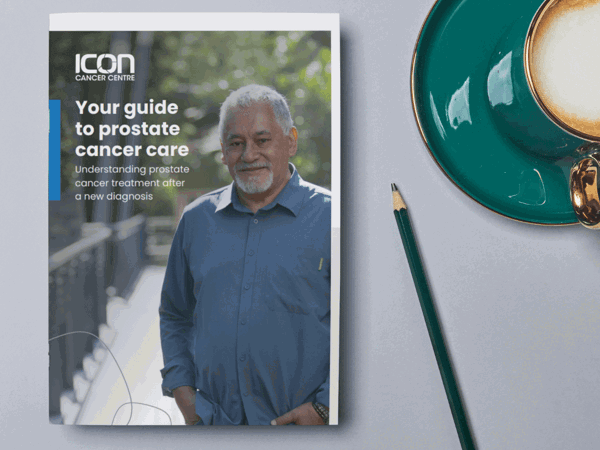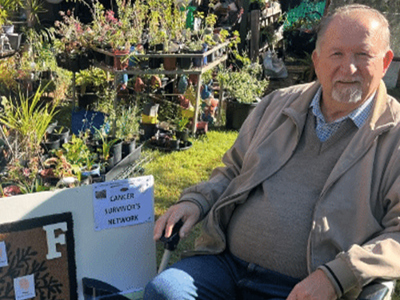
Everything you need to know about scalp cooling
He credits this structured career as one of the reasons he was able to adapt to the daily routine of radiation therapy sessions following a prostate cancer diagnosis.
"I think my military background helped me with the structured nature of having radiation therapy. It can be difficult managing life around radiation therapy. It’s a commitment that you have to undertake each weekday for a number of weeks. You have to go into each session with a full bladder for prostate cancer treatment, which is difficult to manage. But I didn’t let my cancer treatment rule my life," says David.
The 71-year-old was diagnosed with prostate cancer in 2018. Two years earlier, David went to the doctor after experiencing difficulties urinating. It was discovered his Prostate Specific Antigen (PSA) levels had risen. David’s GP decided to actively monitor his PSA levels.
Around the same time as David’s prostate cancer diagnosis in 2018, he started experiencing issues with his heart. This forced is medical team to delay David’s prostate cancer treatment and focus on treating his heart condition.
In early 2019, he underwent a medical procedure to help strengthen his heart. Later that year, David was scheduled to undergo a prostatectomy, when he experienced more heart troubles.
"It was a very stressful time. But after having tests (my medical team) worked out that it wasn’t a problem with my heart again. The issue was that I was making myself so stressed about not being able to have the prostate operation, that I had developed an arrhythmia. I knew I had cancer and I was stressing because I couldn’t have the proctectomy or radiation treatment to get rid of it," says David.
Be informed, feel empowered. Our free guide will help you make decisions about your, or your loved ones', care.

In 2020, David underwent a prostatectomy at Greenslopes Hospital. The surgery was a success, however, a small amount of cancer had spread outside the prostate.
In 2021, David underwent radiation therapy at Icon Cancer Centre Springfield under the care of radiation oncologist, Dr Manoja Palliyaguru.

The treatment I received at Icon Springfield was second to none. They couldn’t do enough for me. Everyone was so welcoming and friendly. Ringing the bell to mark my final treatment was a great feeling. That was a wonderful day. They also put the disco lights on in the treatment room on my final day, which was fabulous!"
During his time at Icon Springfield, David connected with some of his fellow prostate cancer patients.
"I connected with people who were going through a similar journey. I got chatting to some of the other men while I was sitting in the waiting room before my treatment. After a few weeks of chatting, we realised how good it was to have others to chat to. We were all going through the journey of radiation therapy and talked about things like having a full bladder for treatment," says David.
From there, the men decided to meet-up outside of the Icon Springfield waiting room. They held their first official get-together in January 2022. The men now try to catch up every three months for lunch. They also hold family gatherings for their wives to come along. Icon Springfield Site Manager, Kurt, is a regular attendee at the gatherings.
The idea is to interface about any issues relating to cancer. It’s been a godsend for me. I was a bit of an introvert about my cancer. I didn’t tell a lot of people. This group has allowed me to have an avenue to express my journey to likeminded people who have been through a similar experience. It’s a safe space to let it all out. We all went through a tough journey and now we’re on the other side.
David is now determined to encourage other men to check their PSA levels.
"Medical advice to me indicated that there is no single simple test currently available to detect prostate cancer. The most common test that I went through is the PSA blood test. My increasing levels of PSA lead to my specialist carrying out a prostate biopsy. The medical techniques for a prostate biopsy procedure have improved significantly over the years and the results are tabulated in reference to the Gleeson score, which then provides the specialist with the data necessary to determine an accurate diagnosis," says David.
The Cancer Council Queensland website indicates that one in twelve men across Australia will be diagnosed with prostate cancer by the age of 70. Regular PSA screening is an important part of your routine blood work that shouldn't be delayed. Talk to your medical professional today.

Discover our comprehensive collection of content designed to inform, support, and guide you through every aspect of cancer care. From the latest news and updates to personal patient experiences and educational resources, these materials provide valuable insights to help you better understand cancer, treatment options, and the journey ahead.